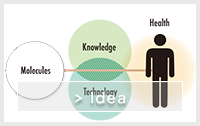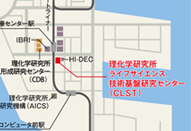Events
[Apr. 5th] RIKEN Seminar: Rapid protein depletion in human cells by the auxin-inducible degron (AID) technology

[DATE]
[HOUR]
[PLACE]
RIKEN Yokohama Campus Main Office Building, 1F Lecture Hall
[Summary]
Genetic perturbation is a powerful way to analyze the function of proteins in vivo. For this purpose, we invented the auxin-inducible degron (AID) technology by transplanting a plant-specific degradation pathway controlled by auxin to non-plant cells. The CRISPR–Cas9 genome engineering technology paved the way to achieve tagging of endogenous genes through the homology-directed repair in human cells. We found that homology arms required for HDR were surprisingly short in human cell lines such as HCT116. We show that donor constructs made by using synthetic DNA can be used for tagging of endogenous genes. This strategy significantly simplifies the construction of donor vectors. We made a series of plasmids for C-terminal tagging with the AID, fluorescent, or purification tag to achieve homozygous tagging just by one transfection and selection. As a recipient cell line for AID tagging, we generated HCT116 cells expressing the OsTIR1 protein by integrating its encoding gene at the safe harbor AAVS1 locus. Using this strategy, we generated conditional AID mutants for essential complexes such as cohesin and dynein. The target proteins mostly disappeared within 60 min after the addition of auxin. I would like to present the history of degron-based genetics and applications for characterization of proteins involved in the maintenance of genomic integrity.
[Speaker]
Masato Kanemaki, Ph.D. (Professor, National Institute of Genetics, ROIS, and Department of Genetics, SOKENDAI)
[Language]
English
[References]
- An auxin-based degron system for the rapid depletion of proteins in nonplant cells. Nishimura K, Fukagawa T, Takisawa H, Kakimoto T, Kanemaki M. Nature Methods 6, 917-922 (2009)
- Rapid protein depletion in human cells by auxin-inducible degron tagging with short homology donors. Natsume T., Kiyomitsu T., Saga Y., Kanemaki MT. Cell Reports 15, 210-218 (2016)
[Host]
Epigenetics Drug Discovery Unit, DSSB (Takashi Umehara, Ph.D)














